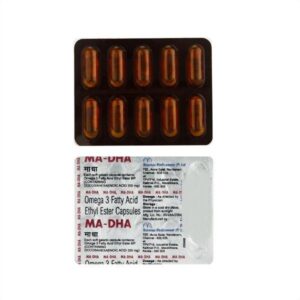DOCOSAHEXAENOIC ACID (DHA)
DOCOSAHEXAENOIC ACID (DHA): DOCOSAHEXAENOIC ACID (DHA) is an omega-3 fatty acid that is found abundantly in fish oil and some marine algae. It is an essential nutrient for brain development and function, particularly during fetal development and infancy. DHA is also thought to have various health benefits for adults.
Use:
DHA is often used as a supplement for pregnant and breastfeeding women to support the healthy development of the baby’s brain and nervous system. It may also be used to treat certain conditions such as ADHD, age-related cognitive decline, and depression. Additionally, DHA is sometimes used to reduce triglyceride levels and lower the risk of heart disease.
Mechanism of Action:
DHA plays a crucial role in brain function and structure. It is a major component of the phospholipids in cell membranes, especially in brain cells. DHA helps improve cell signaling, neuron communication, and synaptic plasticity. It is also involved in the production of anti-inflammatory molecules and the modulation of gene expression.
Dose:
The recommended dose of DHA varies depending on the intended use. For pregnant and breastfeeding women, the recommended dose is typically around 200-300 mg per day. For general cognitive health, doses of 500-1000 mg per day are commonly used. However, it’s important to consult with a healthcare professional to determine the appropriate dosage based on individual needs.
Side Effects:
DHA is generally considered safe when taken at recommended doses. It is well-tolerated by most individuals. However, high doses of DHA may sometimes cause gastrointestinal discomfort, including diarrhea and indigestion. In rare cases, it may also increase the risk of bleeding, so caution should be exercised in individuals taking blood-thinning medications. Allergic reactions to DHA supplements are very rare.
It’s worth noting that despite its potential health benefits, the overall evidence for DHA supplementation is still somewhat inconclusive, and more research is needed to fully understand its effects and optimal dosing recommendations. Therefore, it is always advisable to consult with a healthcare professional before starting any new supplementation.

